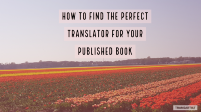How to find the perfect translator for your published book
So now you have finalised your book, had it proofread and edited what feels like a million times, decided on the cover and finally published it. You have given yourself a pat on the back for being so disciplined. You have done all your marketing and the sales start coming in via the platform of your choice, be it Amazon or Kobo or Nook. Normally your work would be done here, right?
What if I told you you could start all over again in a foreign market? I can imagine that this might sound more frightening than pleasant. However, increasing your income on work already done plus reaching more readers doesn’t sound that bad, does it?
To give you a short recap of the last blog post: We learned last time that Germans are big readers and that having your work translated for a German audience might be worthwhile as the stats on the German e-book market are awesome, plus 95 percent of people read their books in German and not in English.
And while marketing to a whole new market does sound scary, I can assure you: If you pair up with a skilled translator you will certainly not be left alone with it.
But how does one find a decent, reliable translator and, most importantly, what does that cost?
Let’s get the numbers out of our system first.
Sure, translation is not free, certainly not if translators want to pay their rent. There are many websites or services that sell translations very cheaply. Like in every other profession, however: You get what you pay for. This is of course applicable to every profession, but especially in the translation world you will find prices that range from a few cents to almost a euro/dollar per word. More often than in other professions, you will find that the quality increases exponentially with the price.
For those unfamiliar with this profession, it can be quite confusing. There are two questions that you could ask yourself to decide whether the translator is underpaid.
"How much do I pay my cleaner?" and "If this is the translator's main job, could they live from it and would it be worth it for them to go freelance full-time for this amount?"
These questions help you to consider whether a translator is serious about their job or translates merely as a hobby.
How do I pay?
There are two common ways to pay a translator. Many translators are used to the pay upfront version. You just pay the translator after the job has been delivered and, if you did not agree on any other rights or percentages, the translator's job is then done.
Another way to pay a translator would be to split royalties. This would mean: You share in the sales of the translated book, e.g. 50:50. In this case, the translator certainly has an interest in your book selling well and will help you with the marketing in the relevant country. Furthermore, you do not need the budget to pay the translator before you have money coming in.
How do I find a skilled translator?
The most common mistake people make when it comes to translation is thinking they can take anyone who is fluent in the target language.
Most often they might think that it cannot be that difficult to transfer the original book into a different language word for word. How difficult can it be: Open a dictionary and get started, right?
But, (I think you saw this one coming): oh no, quite the contrary. Let me be bold and assume that you would want your translated book to be as good as the original and not a weak reflection of the work you have spent so many hours creating.
So let’s sum up the most important points on what you have to look for in a translator:
· A translator should only translate into their native language. In the best case, they should have lived most of their life in that country and should, if they live abroad, have a way to keep their language skills up to date.
· A translator should have a degree in translation or other evidence of their expertise in the field. If someone did not study translation, they have to make up for it with a lot of experience.
· The translator of your choice should have a team with whom they work together, so they can ensure that your book will be proofread and edited by other professionals. If they do not, this is something you would have to take care of.
· They should at least be familiar with the genre of your book.
Okay, but where can one find a good translator that meets all these requirements?
There is of course always the possibility to ask other authors of your genre who have already conquered the German market for the details of their German translators. This can be a big advantage as they already know whether the translators were reliable, pleasant to work with and if they did a good job.
However, not everyone has this option.
Another way to find a translator would be the platform proz.com. There you can post your translation job for free and the prospective translators can bid on your job. Be aware that the cheapest bid is usually not the best. Although it is a little more expensive on proz.com than it is on Freelancer.com, Odesk or Elance, there are far more professional translators on that platform than exchange students or what I like to call hobby translators.
www.babelcube.com is also an interesting platform where you can find translators that accept royalty split deals. But, again, you have to watch out, as you will find many of these hobby translators there, too.
If you cannot find the right match on a platform, you can get in touch with the German translators' association for literature (VdÜ) and they can give you a list of experienced translators.
Or, of course, you can ask us! As a translation agency specialising in the arts, the creative industry and literature, we can most certainly be of help 😉.
Previous blog articles:


